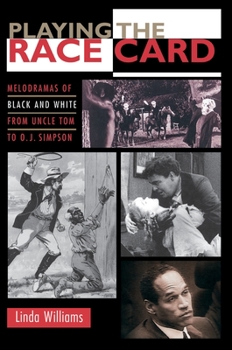Playing the Race Card: Melodramas of Black and White from Uncle Tom to O. J. Simpson
Select Format
Select Condition 
Book Overview
The black man suffering at the hands of whites, the white woman sexually threatened by the black man. Both images have long been burned into the American conscience through popular entertainment, and... This description may be from another edition of this product.
Format:Hardcover
Language:English
ISBN:0691058008
ISBN13:9780691058009
Release Date:May 2001
Publisher:Princeton University Press
Length:408 Pages
Weight:1.65 lbs.
Dimensions:1.3" x 6.0" x 9.3"
Customer Reviews
1 rating
Written on the Body
Published by Thriftbooks.com User , 22 years ago
This is Film Studies of the first order. Williams takes the idea of melodrama as a mode and intersects it with issues of race and its representation. According to her, in conjuction with the popularity or in the legitimization of a particular medium in American society, the representations of the black male and female bodies take on center stage and gain new significations. The book starts out with Stowe's "Uncle Tom's Cabin" and shows how it stays and strays away from the conventions of the Victorian novel. It then focuses on the Stowe's characterization of the black bodies and how they elicited the sympathy of the readers. Next, it shows how Dixon, with his novel "The Clansmen,' either changes or reverses Stowe's characterizations and themes to elicit another kind of response. However, it is D.W. Griffith's adaptation of the novel, "Birth of the Nation" that had a powerful influence in the society's imagination. Not only did the film legitimize the medium as an art form, it also gave the public a new way of understanding race relations in America. The book covers both the novel and the movie adaptation of "Gone With the Wind" and other cultural texts and ends with the televised trial of O.J. Simpson while keeping on the other eye issues of representation. Linda Williams' project is both multi-disciplinary and multi-media and she weaves them together in a rich study of melodrama as a cultural mode and the ever evolving nature of race relations and representations in our society. She wittily uses Henry James' imagery of the 'leaping fish' to show how melodrama dynamically moves from one medium to the next. Each time it makes an appearance in a big way, it also entails a recasting of black and white or racial representations. Williams achievement lies in her ability to pull together a variety of texts and approaches to engage upon the central issue of race. And she does this in clear, well-written prose. Although this is more like a work of cultural criticism, the book also opens up the possibilities of film studies as a powerful lens or a way of approaching cinema-related queries and dealing with socio-historical matters.




